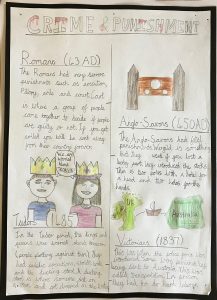We have used the National Curriculum as the foundation for our ambitious curriculum, which allows children to become curious and confident historians.
Our aim is that children become enthusiastic and effective historians by learning disciplinary knowledge (history skills) and facts (substantive knowledge) that enables them to build a clear and lucid appreciation of the past.
Starting in EYFS through to Year 6, children will build rich and detailed knowledge as well as carefully consider links between units of work. For example, when studying the Stone Age, children will look at hunter-gatherers who lived by hunting animals and collecting fruit and nuts, and then move on to explore the first farmers, who domesticated animals and imported crops and cleared fields from the forest.
Teachers will then make deliberate links to farming developments during the Iron Age as well as prepare children for further studies about the significance of farming in Anglo-Saxon times. Children will then study how farming supported civilisations such as the Ancient Greeks and Ancient Egyptians by providing a vital and stable food source. They will know that with a reliable food source, communities can be formed which collaborate and cooperate as well as subsequently from more complex societies.
The ‘Big Ideas’ or ‘golden thread’s for history are:
Below, you will find attached our ‘curriculum plan’ for history which provides an overview of the units of work, children will be studying in each class:
Below, you will find attached the historical knowledge and skills progression from EYFS to Year 6:
Knowledge and skills progression


